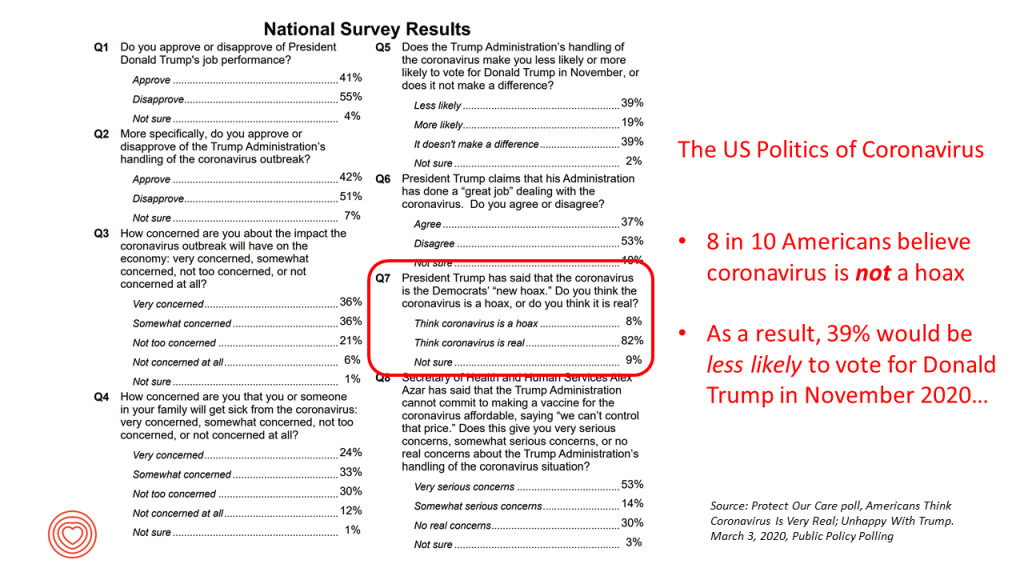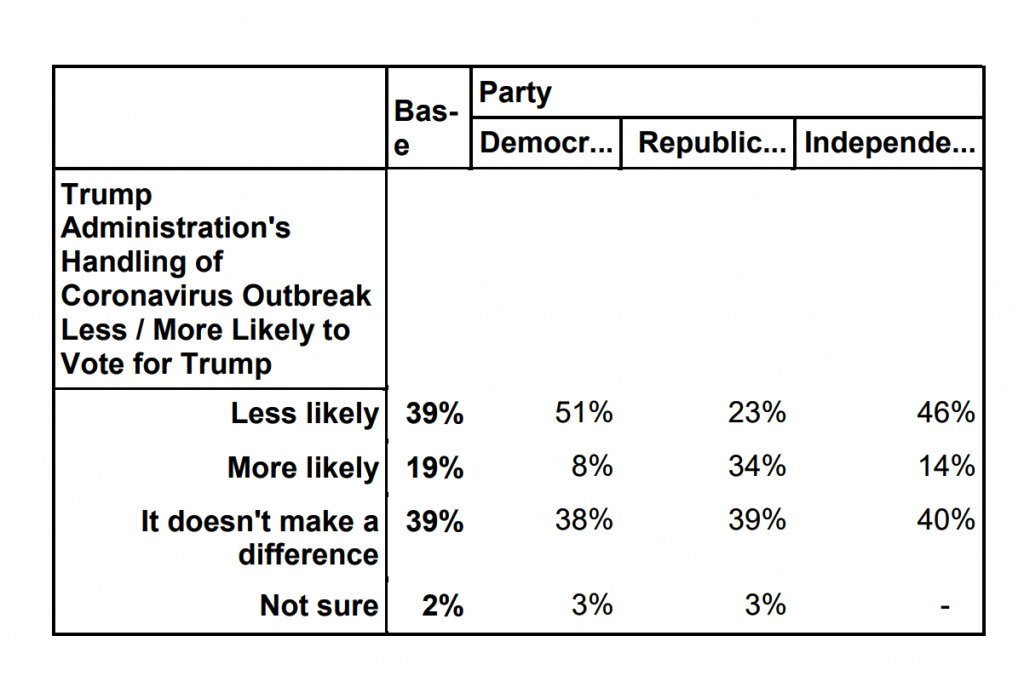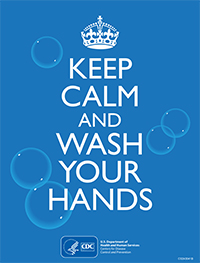 Seven in 10 Americans are concerned about the coronavirus outbreak’s impact on the economy, and 6 in 10 people worried about someone they love getting sick from COVID-19.
Seven in 10 Americans are concerned about the coronavirus outbreak’s impact on the economy, and 6 in 10 people worried about someone they love getting sick from COVID-19.
But most Americans also get the politicized nature of the coronavirus and say they’re less likely to vote for President Trump in November based on his handling of the public health threat, according to a just-released survey from Protect Our Care fielded by Public Policy Polling.
Some of the data points which demonstrate that Americans are taking the emerging coronavirus pandemic quite seriously are that:
- 53% disagree that President Trump and his Administration are doing a “great job” dealing with the coronavirus
- 82% think coronavirus is “real,” and not a hoax of the Democrats as the President as contended
- 67% have serious concerns about the Trump Administration’s not committing to making a vaccine for coronavirus affordable; and,
- 61% have serious concerns about the President’s Chief of Staff saying that people should turn their TVs off for 24 hours to calm financial markets.
Public Policy Polling surveyed 866 registered U.S. voters on March 2nd and 3rd, 2020.
At noon today, I participated in a call where Senator Chris Murphy spoke about the $8 billion bipartisan-sponsored bill to be passed by Congress for supplemental support to confront the coronavirus outbreak and fund testing, treatment and vaccine development. He commented on the context of this study, saying that,
“In many ways, this is the moment that a lot of us have worried about…a true public health threat presented to the country that this President was not ready to meet….this administration has not taken coronavirus seriously enough,” Murphy asserted.
He continued that this is, “A moment to come together…Republicans and Democrats need to work hand in hand to make sure” that the health system can test, identify and treat people. Demonstrating the fact that the GOP and Dems are coming together on this, Murphy said that, “Today, we’re going to pass a package with bipartisan agreement [with the] funding necessary to develop a vaccine, to develop treatments that local public health professionals aren’t left holding the bag financially [for],” and to deploy resources overseas to help stem the viral contagion globally.
Murphy described the “revolving door of leadership” in the White House and the President’s comments suggesting it would be “OK” to go to work while you have the virus.
“They have telegraphed that they don’t take this as seriously as they should,” Murphy believes.
He then commented on the Administration’s efforts to “take health insurance away from millions of Americans,” warning that, “Many Americans this year will sign up for health care that isn’t health care at all…(they are) junk plans that look like insurance but don’t cover anything”…such as coronavirus testing or treatment that people will need, Murphy forecasted.
He concluded his remarks saying that his Congressional colleagues were “doing this” (that is, passing the supplemental bill)” in a spirit of hopefulness that they (the Administration) will get better and do better.”
 Health Populi’s Hot Points: In a public health emergency, health citizens need to trust the sources of information available to help them make informed decisions — for business operations, for travel, and most importantly, for our families.
Health Populi’s Hot Points: In a public health emergency, health citizens need to trust the sources of information available to help them make informed decisions — for business operations, for travel, and most importantly, for our families.
Trust is the top driver that underpins health engagement, and trust has in fact eroded between publics and government agencies around the world — no more so than in the U.S. except for a handful of other countries polled each year in the Edelman Trust Barometer.
Presidents, both Democratic and Republican leaders, have managed America’s health citizens through pandemics in the past two decades, whether swine flu H1N1 in 2009 or Ebola, collaborating with expert staff from the CDC, NIH, public health departments, and other key personnel key to these challenging moments in a nation’s health landscape.
In 2020, we find ourselves in America with that “revolving door” of experts and personnel that Senator Murphy mentioned. The unquestionable leadership of Dr. Anthony Fauci, who led the U.S. through the early HIV/AIDS era and to the current scenario of the condition being treated as chronic, gives many of us a sense of security in that Fauci is committed to science, facts, and a north star of public health.
This second chart is interesting in breaking out Americans by political party ID and their perceptions of the Trump Administration’s handling of coronavirus outbreak — with their likelihood of voting for President Trump in November 2020.
Note that due to coronavirus, 23% of Republicans would be less likely to vote for President Trump in November.
Couple this data point with the finding that the President’s approval rating fell back to 41%, the level from the pre-impeachment interval via Gallup.
 The treatment of the coronavirus has political implications for families and the President alike. The longer the public, across political party, lacks confidence that the current administration has a handle on the virus, growing contagion, testing and treatment availability, the more Independents and some concerned Republicans will lose the solid goodwill they’ve had for this President’s re-election.
The treatment of the coronavirus has political implications for families and the President alike. The longer the public, across political party, lacks confidence that the current administration has a handle on the virus, growing contagion, testing and treatment availability, the more Independents and some concerned Republicans will lose the solid goodwill they’ve had for this President’s re-election.
Public health is a real “thing,” I’ve been tweeting and writing about since before the advent of COVID-19. We’re now living in real-time with the threat of infection through community spread, leading to major disruption in our work lives, our financial portfolios, and ability to participate in leisure time activities.
I’ve had to cancel my participation in the annual HIMSS meeting, scheduled for next week in Orlando, which I haven’t missed in over 20 years. The 40,000 other attendees and hundreds of companies also must abandon their plans to get work done, sell products, gain insights into patient and clinical needs, and spend a ton of money in the Orlando hospitality industry and local economy.
This is but one person’s immediate COVID-19 impact, times 40,000 other peoples’. The political-economic dimensions of this cannot be underestimated.
I wish everyone well, resilience, and the solid Rx of frequent hand-washing per the CDC’s guidance here.





 Interviewed live on BNN Bloomberg (Canada) on the market for GLP-1 drugs for weight loss and their impact on both the health care system and consumer goods and services -- notably, food, nutrition, retail health, gyms, and other sectors.
Interviewed live on BNN Bloomberg (Canada) on the market for GLP-1 drugs for weight loss and their impact on both the health care system and consumer goods and services -- notably, food, nutrition, retail health, gyms, and other sectors. Thank you, Feedspot, for
Thank you, Feedspot, for  As you may know, I have been splitting work- and living-time between the U.S. and the E.U., most recently living in and working from Brussels. In the month of September 2024, I'll be splitting time between London and other parts of the U.K., and Italy where I'll be working with clients on consumer health, self-care and home care focused on food-as-medicine, digital health, business and scenario planning for the future...
As you may know, I have been splitting work- and living-time between the U.S. and the E.U., most recently living in and working from Brussels. In the month of September 2024, I'll be splitting time between London and other parts of the U.K., and Italy where I'll be working with clients on consumer health, self-care and home care focused on food-as-medicine, digital health, business and scenario planning for the future...